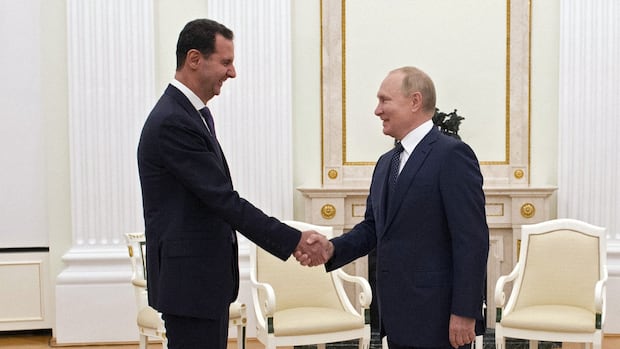Ousted Syrian President Bashar al-Assad says he had no plans to leave the country after the fall of Damascus a week ago, but the Russian military evacuated him after his base in western Syria was attacked .
The comments are Assad's first since he was ousted by insurgent groups. Assad said in a statement on his Facebook page that he left Damascus on the morning of December 8, hours after insurgents stormed the capital. He said he went in coordination with Russian allies to the Russian base in the coastal province of Latakia, where he planned to continue fighting.
Assad said that after the Russian base was attacked by drones, the Russians decided to transfer him on the night of December 8 to Russia.
"I did not leave the country as part of a plan as previously reported," Assad said.
A UK-based war monitor said Israeli airstrikes early Monday hit missile depots in Syria, calling it the "most violent attacks" since 2012. Israel has been hitting what it says are military posts in Syria after the dramatic collapse of the Assad government, eliminating air defenses and most of the arsenal of the former Syrian army.
Israeli troops have also seized a border buffer zone, prompting condemnation, with critics accusing Israel of violating a 1974 ceasefire and possibly exploiting the chaos in Syria for a takeover of lands
Obstacles to establishing Syrian ties
Meanwhile, European Union countries on Monday set the conditions for lifting sanctions on Syria and launching aid amid uncertainty over the intentions of their new leaders just over a week after they took power.
At a meeting in Brussels, top EU diplomats said they want assurances from members of Syria's interim government that they are preparing for a peaceful political future that includes all minority groups, one in which the extremism and former allies Russia and Iran have no place.

Since Assad's ouster, there have been few reports of reprisals, revenge killings or sectarian violence. Most of the looting or destruction was quickly contained.
But the new leadership has yet to set out a clear vision of how Syria will be governed. The interim government was created by former opposition forces led by the Islamic militant group Hayat Tahrir al-Sham, or HTS, a former al-Qaeda affiliate that the E.U., U.S. and Canada consider a terrorist organization.
The interim government will rule until March. Arab foreign ministers have called for UN-supervised elections based on a new constitution. The UN envoy to Syria has pressed for sanctions to be lifted.
Front burner26:42The end of the Assad regime in Syria
To understand more, the EU is sending an envoy to Damascus for talks with those responsible, at least temporarily.
EU foreign policy chief Kaja Kallas said the bloc wants a "stable, peaceful and global government" but that it will likely take weeks, if not months, for Syria's new path to become clear.
"Syria is facing an optimistic, positive, but rather uncertain future, and we have to make sure that it goes in the right direction," he told reporters at a meeting of EU foreign ministers. "For us, it's not just the words, we want to see the deeds."
Syria has been torn apart by five decades of rule by the Assad family. Its economy has been destroyed, poverty is widespread, inflation and unemployment are high, and corruption seeps into everyday life. Millions of people have fled the country.
Hundreds of thousands of them live in Europe, and while some EU countries have suspended asylum applications from Syrian refugees, only those who wish to return will be helped to return home, for now.
More than 100,000 Syrian refugees have arrived in Canada since 2015.
In 2011, the EU began imposing asset freezes and travel bans on Syrian officials and organizations in response to Assad's crackdown on civilian protesters, which turned into a civil war. Sanctions have been imposed on some 316 individuals and 86 entities accused of supporting Assad.
Source link

